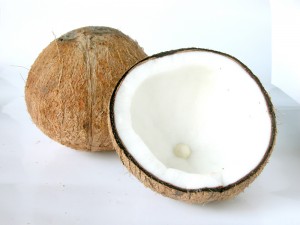
Coconut Oil: Healthy Substitute or Not?
 You may have heard that coconut oil can be used as a healthy substitute for other oils, such as olive oil or canola oil. But is it really as healthy as people think?
You may have heard that coconut oil can be used as a healthy substitute for other oils, such as olive oil or canola oil. But is it really as healthy as people think?
Coconut oil has become a popular substitute for other oils because it is not stored readily as body fat. However, 92 percent of the fat in coconut oil is saturated fat, which is an unhealthy dietary fat that raises total blood cholesterol levels and LDL (bad) cholesterol levels. This is far more saturated fat than most other common oils, such as olive and soybean oils, which contain approximately 15 percent saturated fats.
Looking at recent research, when substituting conventional coconut oil for olive or canola oil, there was virtually no difference in weight loss and a slight increase in both LDL (bad) and HDL (good) cholesterol. However, using conventional coconut oil instead of butter or lard has been shown to provide a modest impact on weight loss.
The studies looking at the health effects of virgin coconut oil compared to conventional coconut oil are currently very limited. Both virgin and conventional coconut oils contain the same saturated fats, but more research needs to be conducted to determine whether virgin coconut oil is healthier.
So should you use start using coconut oil? Coconut oil may be a useful substitute for butter and lard in recipes for health benefits, but as a replacement for other oils such as olive oil and canola oil, more research needs to be done. There are many studies supporting the use of canola oil, olive oil and nut oils, which all contain a higher amount of monounsaturated and polyunsaturated fats (both are healthy dietary fats that can improve blood cholesterol levels) and have been shown to benefit heart health. Therefore, at this time, there is no need to substitute these oils with coconut oil.
The Bottom Line:
- Preliminary research has shown some health benefits of coconut oil. However, more evidence is needed to make generalized recommendations for the use of coconut oil regarding weight loss and heart disease risk.
- There is no strong research that supports that virgin coconut oil does less damage to your heart than conventional coconut oil.
- Keep in mind with any type of oil you use, they can all be high in calories if you use too large of portions. One gram of fat equals nine calories, which means that two tablespoons of coconut oil (or most other oils) is about 240 calories. This makes it very easy to consume excess calories when you don’t measure out your oil.
- Lastly, according to the 2010 Dietary Guidelines for Americans, the recommendation is to consume less than 10 percent of calories from saturated fats. Therefore, if you plan to use coconut oil as a substitute for oils, butter or lard, be sure that it does not make up more than 10 percent of your daily total calories.